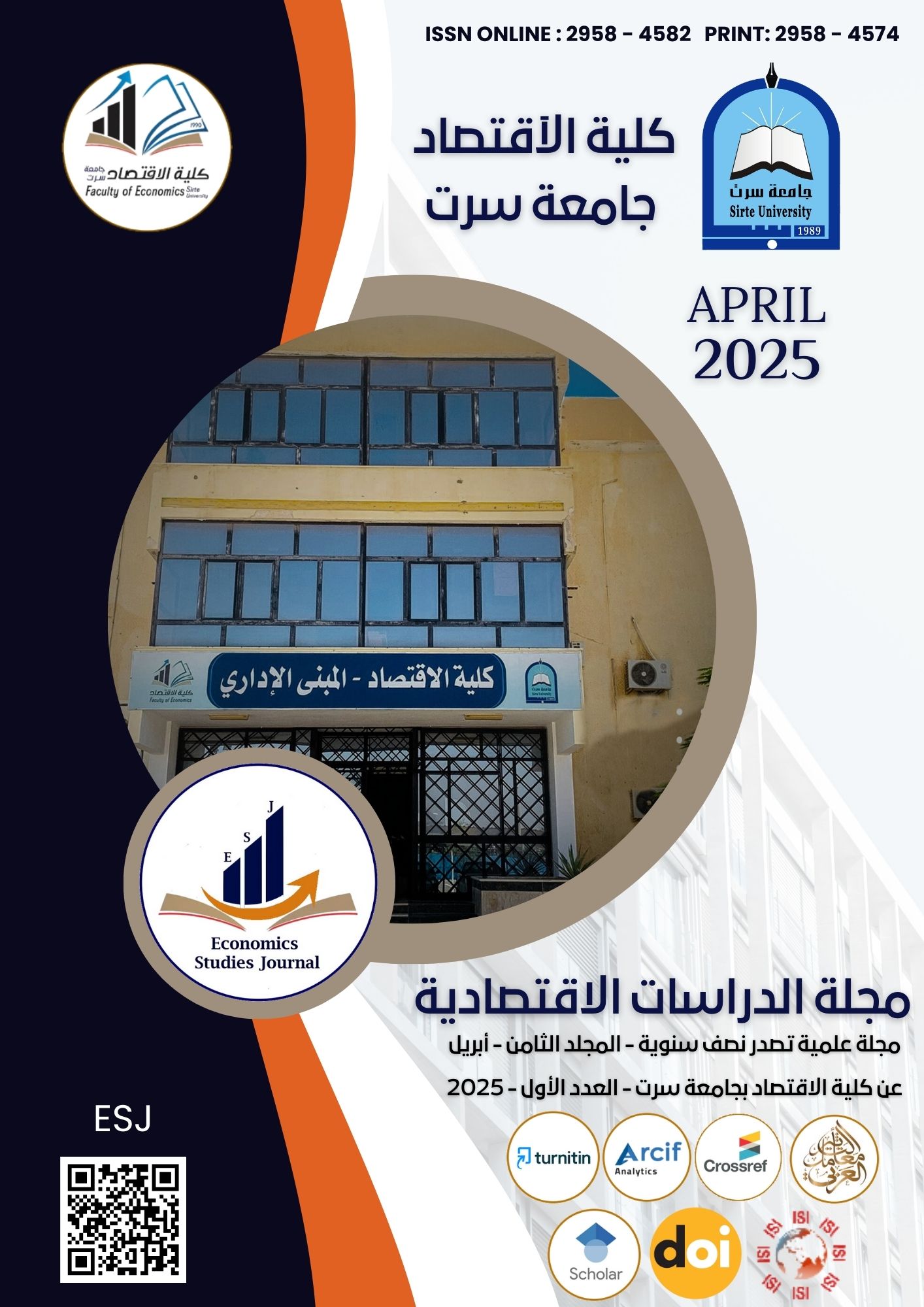أهمية تطبيق الأمن السيبراني المحاسبي في المصارف التجارية الليبية: دراسة تطبيقية على المصارف التجارية العاملة في مدينة سرت
DOI:
https://doi.org/10.37375/esj.v8i1.3264الكلمات المفتاحية:
الأمن السيبراني، الامن السيبراني المحاسبي، المحاسبة، التهديدات السيبرانية، المصارفالملخص
تهدف هذه الدراسة إلى تسليط الضوء على أهمية تطبيق الأمن السيبراني المحاسبي في المصارف التجارية الليبية العاملة في مدينة سرت. ولتحقيق أهداف الدراسة، تم اعتماد المنهج الوصفي التحليلي، حيث تم استخدام الاستبانة كأداة رئيسية لجمع البيانات، مع التأكد من صدقها وثباتها. كما تم تحليل البيانات باستخدام برنامج (SPSS) من خلال تطبيق الأساليب الإحصائية الوصفية والاستدلالية. وأظهرت نتائج الدراسة أن موظفي المصارف التجارية في مدينة سرت يرون أن مصارفهم تدرك وتعي أهمية تطبيق الأمن السيبراني المحاسبي. كما أشارت النتائج إلى وجود تحديات وعقبات كبيرة تواجهها هذه المصارف في تطبيق الأمن السيبراني المحاسبي. بالإضافة إلى ذلك، أكدت النتائج أن هناك اهتمامًا كبيرًا من قبل المصرف المركزي والمصارف التجارية في مدينة سرت بتعزيز الأمن السيبراني المحاسبي، حيث يركز هذا الاهتمام على جوانب حيوية مثل: حماية البيانات المالية الحساسة، تعزيز الثقة والمصداقية، تقليل المخاطر، وضمان الامتثال للمعايير الأمنية. وأخيراً قدمت الدراسة مجموعة من التوصيات أهمها: يجب تنظيم دورات وورش عمل دورية لموظفي المصارف لتعزيز وعيهم بأحدث التهديدات السيبرانية وأفضل الممارسات الأمنية. كما ينبغي الاستثمار في تقنيات الأمن السيبراني المتطورة وتحديث الأنظمة بشكل مستمر لمواكبة التطورات التكنولوجية والمخاطر الجديدة. بالإضافة إلى ذلك، من الضروري تعزيز التعاون مع المصرف المركزي والجهات الحكومية لتبادل المعلومات والخبرات في مجال الأمن السيبراني، مما يدعم الجهود المشتركة في هذا المجال..
المراجع
قائمة المراجع:
أولاً: المراجع العربية:
- الحيمودي, بدر. (2023). الأمن السيبراني وحماية الأنظمة المعلوماتية. مجلة شمال إفريقيا للنشر العلمي (NAJSP), 174-189. 189.
- العرابي، ماجد قليل محمد، أبو عنزه، اسماء. (2024). دراسة تطبيقية عن دور إدارة المخاطر في تعزيز الأمن السيبراني للمؤسسات الصغيرة والمتوسطة في المملكة العربية السعودية". المجلة الدولية للعلوم المالية والإدارية والاقتصادية، الإصدار (3)، العدد (10).
- النقودي, سوزي فاروق. (2024). أثر الأمن السيبراني على تعزيز تقنيات التحول الرقمي في بيئة الأعمال المحاسبية. مجلة البحوث المحاسبية, 11(4) , 169-216.
- بالقاسم، أمحارب سعد سليمان، وحسين، أحمد محمد سليم. (2017). واقع مخاطر أمن نظم المعلومات المحاسبية الإلكترونية بالمصارف التجارية الليبية العاملة بمدينة البيضاء. المؤتمر العلمي الدولي الأول: التحوط وإدارة الخطر بالصناعة المالية الإسلامية، عمان: مركز السنابل للبحث وتطوير الموارد البشرية ومركز بيان للهندسة المالية والإسلامية، 25 - 55.
- عبد الله، إيمان السيد محمد (2024). دارسة العلاقة بين تفعيل ادوات الأمن السيبارني وأنظمة محاسبة التكاليف الرقمية: دارسة تطبيقية على شركات القطاع العقاري بمصر، المجلة العلمية للبحوث والدراسات التجارية، المجلد 38 - العدد الأول.
- عبد الله، وليد. (2024). الهجمات السيبرانية المتكررة تقلق المؤسسات المالية في ليبيا. اندبندنت عربية.
- عبد المهدي، حنين (2020). " أثر تطبيق سياسة الأمن السيبراني على جودة المعلومات المحاسبية في البنوك التجارية الأردنية", رسالة ماجستير غير منشورة، كلية الاقتصاد والعلوم الإدارية، جامعة آل البيت، ص 19-26.
- محيي الدين إبراهيم موسي، مي، بكر عربي الشريف، محمد، & سعيد عبد العظيم أحمد، أحمد. (2024). الآليات المقترحة لتفعيل دور الأمن السيبراني في تحسين أداء المحاسب الإداري وإنعكاسه على الميزة التنافسية للمنشأة. المجلة العلمية للدراسات التجارية والبيئية, 15(3) , 26-52.
- مطروح، وفاء.، وأونيس، ابتسام (2022). تداعيات جائحة كوفيد-19 وتأثيرها على تحقيق الأمن السيبراني في الجزائر. المجلة الدولية للاتصال الاجتماعي, 9(2) , 219-241.
- يوسف، علد السلام عطية عبد السلام (2024). تقييم تأثير التهديدات السيبرانية على نظم المعلومات المحاسبية في المؤسسات المالية الليبية: دراسة وصفية، المجلة العلمية للدراسات التجارية والبيئية، المجلد الخامس عشر، العدد الأول.
ثانياً: المراجع الأجنبية:
- Abrahams, T. O., Ewuga, S. K., Kaggwa, S., Uwaoma, P. U., Hassan, A. O., & Dawodu, S. O. (2024). “Mastering compliance: a comprehensive review of regulatory frameworks in accounting and cybersecurity”. Computer Science & IT Research Journal, (5)1, p. 121, 133.
- Abrahams, T. O., Ewuga, S. K., Kaggwa, S., Uwaoma, P. U., Hassan, A. O., & Dawodu, S. O. (2023). Review of strategic alignment: Accounting and cybersecurity for data confidentiality and financial security. World Journal of Advanced Research and Reviews, 20(3), 1743-1756.
- Canelón, J., Huerta, E., Leal, N., & Ryan, T. (2020). Unstructured data for cybersecurity and internal control. Proceedings of the 53rd Hawaii International Conference on System Sciences.
- Daoud, M. M., & Serag, A. A. (2022). A proposed Framework for Studying the Impact of Cybersecurity on Accounting Information to Increase Trust in The Financial Reports in the Context of Industry 4.0: An Event, Impact and Response Approach. Trade and Finance, 42(1), 20-61
- Hasan, L., Hossain, M. Z., Johora, F. T., & Hasan, M. H. (2024). Cybersecurity in accounting: Protecting financial data in the digital age. European Journal of Applied Science, Engineering and Technology, 2(6), 64-80.
- Moreira, G. P. (2019). Cybersecurity and External Audit: The Disclosure of Risk Factors in Annual Reports (Master's thesis, Universidade Catolica Portuguesa (Portugal)), https://core.ac.uk/download/237231002.pdf
- Morshed, A., & Khrais, L. T. (2025). Cybersecurity in Digital Accounting Systems: Challenges and Solutions in the Arab Gulf Region. Journal of Risk and Financial Management, 18(1), 41.
- Polishchuk, V., Fedirko, N., Grytsyshen, D., Ohdanskyi, K., & Kotkovskyy, V. (2024). Analysis of the Impact of Cybersecurity on The Stability of Financial Institutions. International Journal of Religion, 5(9), 302-309.
- Renaud, K., Von Solms, B., & Von Solms, R. (2019). How does intellectual capital align with cyber security?. Journal of Intellectual Capital, 20(5), 621-641. https://core.ac.uk/download/237029625.pdf.
- Sallos, M. P., Garcia-Perez, A., Bedford, D., & Orlando, B. (2019). Strategy and organisational cybersecurity: a knowledge-problem perspective. Journal of Intellectual Capital, 20(4), 581-597.
- Shaker, A. S., Al Shiblawi, G. A. K., Union, A. H., & Hameedi, K. S. (2023). The role of information technology governance on enhancing cybersecurity and its reflection on investor confidence. International Journal of Professional Business Review: Int. J. Prof. Bus. Rev., 8(6), 7.
- Tawalbeh, L., Tawalbeh, H., Song, H., & Shen, Y. (2023). Cybersecurity challenges and solutions in the era of digital transformation: A review. IEEE Access, 11, 274-293.
- Torres, R. A. G., & Olipas, C. N. P. (2024). Analyzing Student Academic Performance and Cybersecurity Awareness Levels: Basis for Enhancing Instruction.
- Unar, A. A. (2024). Cybersecurity Risks for Professional Services Firms: Assessing Vulnerabilities, Proposing Innovations, and Safeguarding Client Trust. The Repository at St. Cloud State, https://core.ac.uk/download/615522964.pdf




































